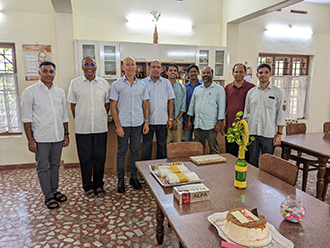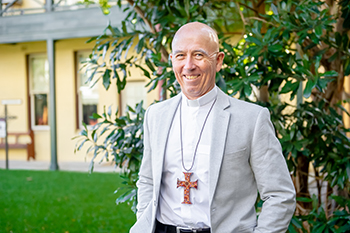The Church in Australia is “consistently poor” at providing adequate support and accompaniment for migrant priests and needs to urgently improve its efforts, according to Brisbane Auxiliary Bishop Tim Norton SVD.
The Divine Word Missionary, who has spent much of his religious life overseas, spoke to the National Centre for Evangelisation recently about the challenges that overseas-born clergy face and how the Church – both ordained and laity – can best support them in their priesthood.
With an increasingly multicultural Catholic community in Australia, including among the clergy, Bishop Norton says the Church in Australia has reached a “tipping point”.
“More than half the priests in this Archdiocese (Brisbane) are now born somewhere else. And from what I'm seeing in the other dioceses, it's a fairly similar story,” he says.
“The fact that we have guys from many parts of the world, for me, is quite reasonable because it reflects the people we're working with who are principally migrants or second-generation migrants.
“In regional areas, the Church is still fairly Anglo- or Euro-Australian, in contrast to the larger urban centres, which are made up largely of migrants or children of migrants.”
But despite the growing migrant population among Australia’s clergy, Bishop Norton says overseas-born priests are not sufficiently represented in leadership roles.
“We're reluctant to bring overseas-born priests into leadership roles because of the support that's required to help them enter into those roles,” he says. “And therefore, we don’t learn and grow from what they have to offer in those roles. We worry about linguistic ability and we worry about conceptual ability.”
 Earlier this year, Bishop Norton ran a course for priests who had recently arrived in Australia, where he stressed the importance of accompaniment for migrant clergy.
Earlier this year, Bishop Norton ran a course for priests who had recently arrived in Australia, where he stressed the importance of accompaniment for migrant clergy.
“People who are accompanied in any cultural transition for any role, much less a role as a cleric, do so much better than those who don't receive that level of accompaniment,” he says.
“I’m convinced that these cultural transitions are really important to address because the person who is undertaking the transition will find themselves more at home, more able to perform, more able to really be part of mission in a new place if they are appropriately informed and accompanied, and we're just not doing that sufficiently.
“For the sake of the mission of the Church here in Australia, I think the guys that do come deserve more skilled attention, more personal attention and more direction.”
Remote and rural dioceses, which in some cases are served almost entirely by overseas-born clergy, can be particularly challenging situations for migrant priests to be placed in, Bishop Norton says.
“Those situations require a whole lot of work in order to help those priests in those places,” he says. “But we are reluctant to direct the appropriate time and resources to these processes.
“I don't think we're really utilising these priests appropriately and helping to skill them in the spaces they find themselves in here in ministry.”
At a local level, Bishop Norton says parishioners need to be “supportive and challenging in measured ways” towards migrant priests.
“They could start by maybe inviting them for a meal,” he says. “They could also look to some skills services support, such as accent modification. Those services are available professionally.
“If the priest born overseas was open to having a small group of trusted people who would give him some assistance on the preparation of his weekly or regular homilies, and then some appropriate feedback, that could be done.”
More broadly, Bishop Norton says there’s a need for a general acceptance that the demographics of Catholics in Australia has changed significantly.
 “It would be helpful if we could first realise together that it's not an autochthonous church – meaning it's run by people who are from the local culture for people who are from the local culture. That's not the Church in Australia anymore, except in small places,” he says.
“It would be helpful if we could first realise together that it's not an autochthonous church – meaning it's run by people who are from the local culture for people who are from the local culture. That's not the Church in Australia anymore, except in small places,” he says.
“The Church is much more diverse today and, I think, much more interesting.”
There’s also a need for an intentional meeting between cultures, an exchange of gifts and talents, and an appreciation for the unique background and life skills that clergy from overseas bring.
“There’s quite a lot of joy and excitement in helping clergy realise and grow in their own personality and actually work out what part of their skill set they need to leave aside, and what part of their skill set they can really utilise and then grow,” Bishop Norton says.
During the Archdiocese of Brisbane’s Summit event in May, Bishop Norton encouraged lay Catholics to be “intercultural advocates”, which he says requires an understanding that almost everything we learn and how we learn comes from our first culture.
“It would be useful if we could do some more work to both appreciate the great things that come from our first cultures, but also recognise the difficult things, the challenges and those blind spots that originate from our first culture, the prejudices that we carry,” Bishop Norton says.
“That helps us be open a little more to other people, understand that they've been formed in their first cultures, too. It gives us other points of actually encountering one another.
“If I am truly convinced of the wonderful gifts that people who are different to me have to bring to mission and ministry, then I have an obligation to help them find their way in this space, in this culture, so that they and I can grow together.”
Links
‘Integral Ecology’ (Presentation by Bishop Tim Norton – Summit 2023)
Images: Bishop Tim Norton in Bangalore, India with participants in the inaugural Australian Program in Pastoral Management for Priests (Facebook). Bishop Tim Norton (ACBC).
Words: Matthew Biddle



